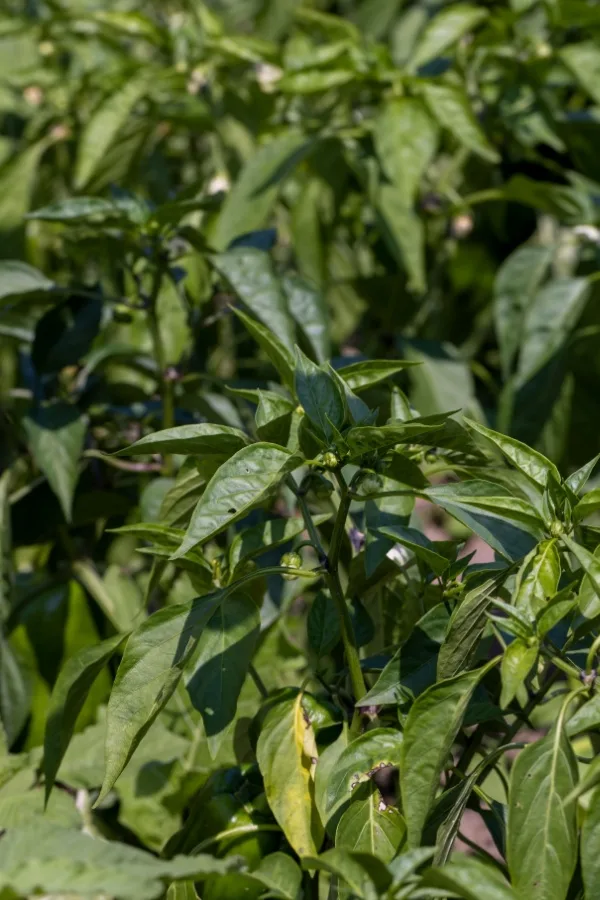Best Fertilizers for Peppers: Accomplish Superior Results in Your Yard
Wiki Article
Organic Vs. Synthetic Fertilizers: Which Is Best for Nurturing Healthy Pepper Plants?
In the world of nurturing healthy and balanced pepper plants, the selection in between natural and artificial plant foods stands as a critical choice with far-ranging effects. While both alternatives purpose to offer vital nutrients to support plant growth, the subtleties of their effect on the soil, plant wellness, and the environment spark a debate that echoes throughout the gardening community. Recognizing the distinctive advantages and possible mistakes of each fertilizer type is critical for pepper farmers seeking to maximize their yields while keeping a lasting and eco-conscious method.Benefits of Organic Plant Foods
Organic plant foods supply an environmentally-friendly and sustainable technique to beneficial pepper plants, giving vital nutrients without the use of synthetic chemicals. These all-natural plant foods are stemmed from natural sources such as compost, manure, bone dish, and algae, advertising dirt health and biodiversity. Unlike synthetic fertilizers, natural choices launch nutrients slowly, guaranteeing a well balanced and steady supply for pepper plants to flourish.One significant advantage of natural fertilizers is their capability to boost dirt framework and water retention. By enhancing dirt health, natural plant foods promote advantageous microbial activity, which assists in nutrient uptake by pepper plants. Additionally, organic fertilizers reduce the danger of chemical run-off, safeguarding water resources from contamination and securing the atmosphere.
Additionally, natural fertilizers add to lasting dirt fertility by advertising the development of beneficial dirt organisms. These microorganisms assist damage down raw material, launching nutrients in a type that is easily accessible to pepper plants. best fertilizers for peppers. By cultivating a healthy dirt community, natural fertilizers support sustainable pepper growing techniques that profit both plants and the setting
Downsides of Synthetic Fertilizers
Synthetic fertilizers, in comparison to their organic counterparts, present numerous disadvantages when used to nurture pepper plants, affecting both plant wellness and environmental sustainability. One major drawback of synthetic plant foods is their propensity to leach nutrients from the dirt quickly.Furthermore, the overuse of synthetic fertilizers can contribute to water air pollution. Excess plant foods not absorbed by plants can remove into water bodies, resulting in eutrophication, where algae blooms deplete oxygen degrees in the water, hurting water life. Moreover, artificial plant foods are typically originated from non-renewable resources, such as nonrenewable fuel sources, adding to carbon discharges and environmental deterioration throughout their manufacturing.
Nutrient Absorption Comparison
Effective nutrient absorption plays a critical function in the total health and wellness and development of pepper plants. When contrasting artificial and natural plant foods in terms of nutrient absorption, natural fertilizers have the benefit of providing a much more balanced and slow-release source of nutrients (best fertilizers for peppers). Organic fertilizers consist of a selection of macro and micronutrients that are not only valuable for the plants but also advertise healthy and balanced dirt microbial activity, which helps in nutrient uptake. On the various other hand, synthetic fertilizers frequently supply a quick launch of nutrients, which can result in leaching and runoff, leading to lower nutrient absorption rates by the plants.In addition, organic fertilizers boost dirt framework and water retention capacity, permitting pepper plants to gain access to nutrients a lot more effectively. This better soil top quality assists in origin growth, allowing far better nutrient absorption. Artificial plant foods, although at first enhancing plant development as a result of their high nutrient concentrations, might impede long-term nutrient absorption by derogatory soil wellness over time.
Environmental Effect Considerations

On the various other hand, artificial great post to read fertilizers, although commonly more immediately offered and focused to plants, can have harmful impacts on the setting otherwise applied appropriately (best fertilizers for peppers). Their production requires high energy inputs, resulting in greenhouse gas emissions and contributing to environment adjustment. The drainage of excess synthetic plant foods can pollute water resources, leading to eutrophication and damaging aquatic ecosystems.
Finest Plant Food Practices for Peppers
When feeding pepper plants, optimizing nutrient uptake and lessening environmental influence are vital considerations. To attain this, it is important to follow best fertilizer practices tailored to the details demands of pepper plants. One vital practice is to perform a dirt examination prior to applying any type of fertilizers. This test can identify the pH level of the soil and recognize any type of nutrient deficiencies, assisting you in picking one of the most suitable fertilizer formula.Another essential technique is to fertilize pepper plants at the correct time. Normally, peppers gain from obtaining plant food at growing and then once again when they begin to flower. Over-fertilizing can bring about nutrient inequalities and damage the plants, so it is vital to follow advised application rates.
Additionally, selecting a balanced fertilizer with an NPK proportion that suits pepper plants' requirements is fundamental. Ultimately, incorporating synthetic and organic plant foods sensibly can aid support healthy pepper plants while decreasing ecological influence.
Conclusion

Organic fertilizers use an environmentally-friendly and lasting strategy to beneficial pepper plants, giving important nutrients without the usage of synthetic chemicals. Unlike artificial plant foods, natural alternatives release nutrients slowly, ensuring a stable and well balanced supply for pepper plants to grow.
Synthetic fertilizers, in comparison to their organic counterparts, position numerous downsides when utilized to nourish pepper plants, impacting both plant wellness and find out here now environmental sustainability. When contrasting synthetic and organic plant foods in terms of nutrient absorption, organic plant foods have the advantage of offering a more well balanced and slow-release resource of nutrients.Moreover, organic plant foods enhance soil framework and water retention capacity, enabling pepper plants to accessibility nutrients extra successfully.
Report this wiki page